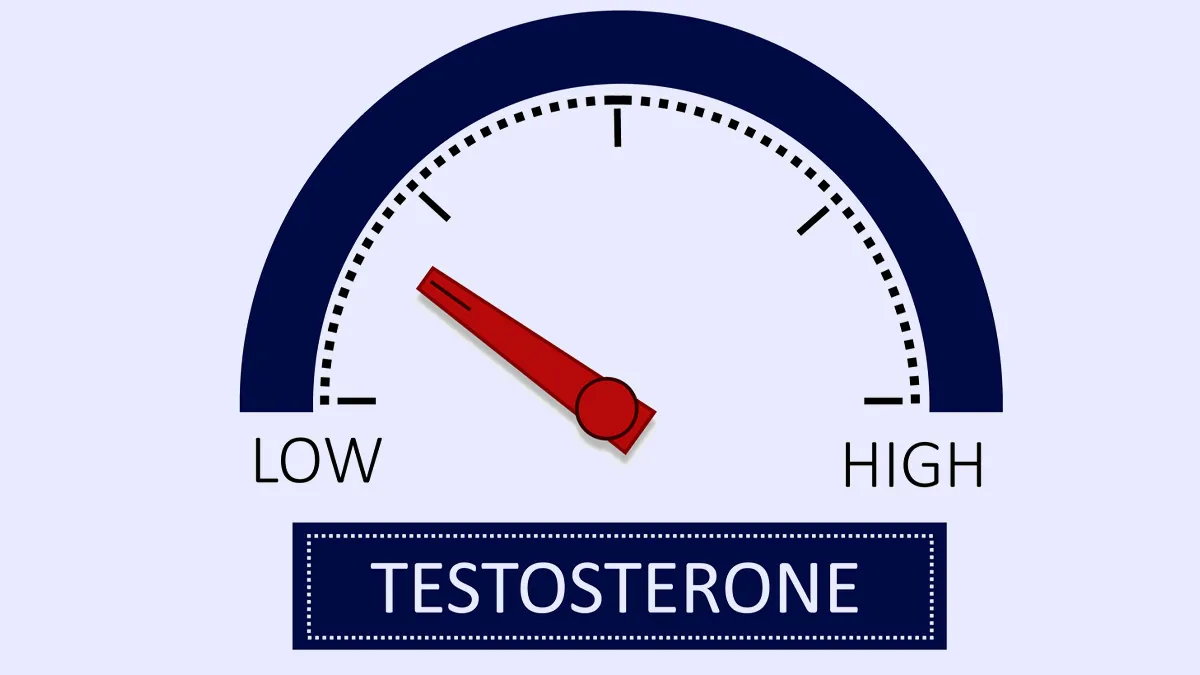
Testosterone is a male hormone that plays a crucial role in maintaining various aspects of men’s health like muscle mass, energy levels, mood, and sexual function. However, certain factors like ageing, unhealthy lifestyle, may lead to decline of testosterone levels. Low testosterone can cause various physical and emotional symptoms.
Low testosterone, also known as hypogonadism, can significantly impact quality of life if left unaddressed. Recognising the warning signs early and taking appropriate measures to restore hormonal balance is essential for overall well-being.
To understand the warning signs of low testosterone and how to manage it, OnlyMyHealth team interacted with Dr Yogesh Jadhav, Gynaecologist, Arogya Hospital, Baramati, Maharashtra.
Red Flags of Low Testosterone
According to Dr Jadhav, here are five major signs that could indicate a dip in testosterone levels:
Decreased Libido
"A significant reduction in sexual desire can be a primary indicator of low testosterone," says Dr Jadhav. Testosterone is essential for maintaining a healthy sex drive, and a noticeable decline in libido could be an early warning sign.
Fatigue and Low Energy

Persistent tiredness, lack of motivation, and a general sense of sluggishness can be attributed to low testosterone levels. "Feeling unusually tired or experiencing a decrease in stamina despite adequate rest could be linked to hormonal imbalance," explains Dr Jadhav.
Loss of Muscle Mass
Testosterone plays a vital role in muscle building and maintenance. "Men with low testosterone may find it challenging to maintain or build muscle even with regular exercise," notes Dr Jadhav. This can lead to a loss of strength and overall fitness.
Mood Changes
Hormonal fluctuations can have a significant impact on mental health. Dr Jadhav points out that "increased irritability, depression, and a lack of motivation or focus could be linked to low testosterone levels." These mood changes can affect daily life and relationships.
Also read: Even Men Have PMS Symptoms! Exploring The Irritable Male Syndrome (IMS)
Changes in Body Fat Distribution

An increase in body fat, especially around the abdomen, could be a sign of hormonal imbalance. "This fat accumulation can contribute to metabolic syndrome, which includes conditions such as high blood pressure, insulin resistance, and increased risk of cardiovascular disease," warns Dr Jadhav.
Ways to Recover from Low Testosterone

Fortunately, there are several ways to address and manage low testosterone levels. Dr Jadhav outlines effective strategies to regain hormonal balance:
1. Medical Therapy
"Testosterone Replacement Therapy (TRT) can be considered under strict medical supervision," advises Dr Jadhav. TRT is available in various forms such as gels, injections, patches, or pellets. However, it is crucial to consult a healthcare provider before opting for this treatment due to potential side effects, including cardiovascular risks and dependency.
2. Lifestyle Changes

Exercise:
Regular strength training, particularly compound movements like squats, deadlifts, and bench presses, can naturally boost testosterone levels.
Healthy Diet:
"A balanced diet rich in proteins, zinc, vitamin D, and healthy fats can support testosterone production," suggests Dr Jadhav. Foods such as eggs, fish, lean meats, nuts, and seeds are beneficial.
Weight Management:
Reducing excess weight, especially abdominal fat, can significantly improve testosterone levels.
3. Sleep Optimisation
Sleep is essential for hormonal balance. Dr Jadhav recommends aiming for "7-9 hours of quality sleep per night, as poor sleep can drastically decrease testosterone levels." Establishing a consistent sleep routine and minimising screen time before bed can improve sleep quality.
4. Stress Management

According to a study conducted by the Journal of Endocrinology and Diabetes, chronic stress can lead to elevated cortisol levels, which negatively impact testosterone production. "Practices such as yoga, meditation, or regular physical activity can help lower stress and support hormonal balance," says Dr Jadhav.
5. Supplements (Under Medical Advice)
Certain supplements can support testosterone levels when taken under medical supervision:
Vitamin D: Often linked with testosterone production, ensuring adequate levels can help improve hormonal health.
Zinc and Magnesium: These essential minerals play a crucial role in testosterone synthesis.
6. Avoiding Endocrine Disruptors
Exposure to environmental toxins can negatively impact hormone balance. "Limiting the use of plastic containers (which contain BPA), reducing pesticide exposure, and choosing natural personal care products can help," advises Dr Jadhav.
Conclusion
Dr Jadhav emphasises the importance of consulting a healthcare provider before making any significant lifestyle changes or starting medical treatments. "A thorough diagnosis, including blood tests to measure testosterone levels, should always be the first step before considering any intervention," he said.
By adopting these strategies, individuals experiencing symptoms of low testosterone can take proactive steps to restore hormonal balance. However, results may vary from person to person, and regular monitoring is essential for long-term health benefits.
Also watch this video
How we keep this article up to date:
We work with experts and keep a close eye on the latest in health and wellness. Whenever there is a new research or helpful information, we update our articles with accurate and useful advice.
Current Version